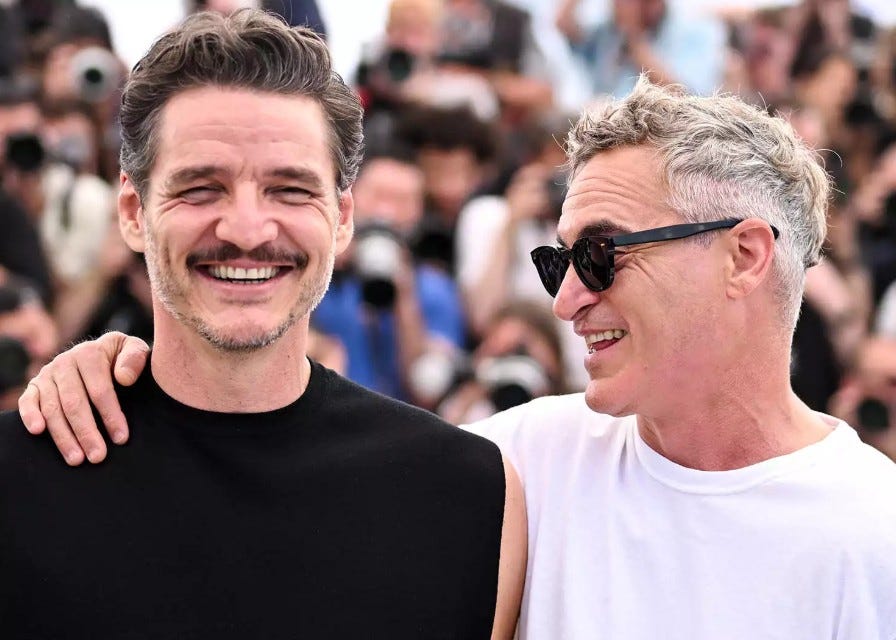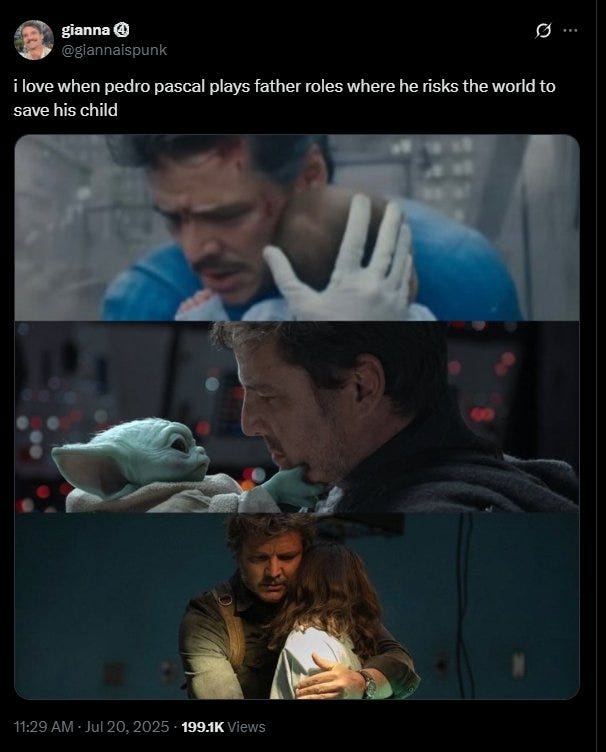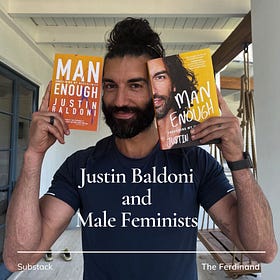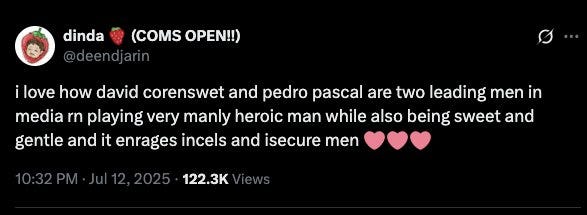Is Pedro Pascal our Masculinity Savior?
No. Of course not. Why do we keep saying he is?
A few months have passed and we as a society have collectively decided that we have crowned a new “Good Man” and his name is Pedro Pascal. The Chilean born, American raised actor has three movies out this year (‘Materialists’ 1the new movie by Celine Song, ‘Eddington’ the new movie by Ari Aster2, and the a high profile MCU movie “Fantastic Four: First Steps”3) plus a high profile TV show (the just ended second season of HBO’s “The Last of Us”4), so it seems like a good time like any for us as a collective to shine a spot light on him.
Every year we have an “It” person, and this year it seems like it’s Pascal. However, the way people have been talking about him has given me a bit of an…ick. At least in regards to crowning Pascal not only a good actor, not only a good person, but an ideal person. Some articles are even calling Pascal…a movement.
From the newspaper El Pais from Spain, “More than a man, a movement: Why everyone loves Pedro Pascal”, it’s an opinion piece that make effort to sy that Pedro Pascal is not just a human, he is leading the chorus of rejecting toxic masculinity. From the article:
“Hence part of the mass furor toward Pascal, or other men like him, who ‘offer alternatives, sexy alternatives at that, to the model promoted by the manosphere, the incels, and, in general, all those masculinities that revolt against change and entrench themselves to defend privileges they feel are threatened.’ Aresti believes it’s “important” that such men exist.”
Personally, I like the ideas of alternatives of masculinity, my personal favorite masculinity/gender thought pattern is called Multiple Masculinities,. It was coined my Raewyn Connell, but popularized by Joseph Gelfer’s Five Stages of Masculinities. The Five Stages talk about how as a society and individually as we become more aware of our gender identity (specifically Masculinity) and question how societally it moves then our view of gender changes. The fourth stage is called “Multiple Masculinities” and it’s a guideline on how we speak and think about masculinity in general.
If we are in Stage 4 we believe in three things:
“First, masculinity can mean anything to anyone (including being embodied by women)”
“Second, masculinity is defined and categorized through power dynamics such as patriarchy and hegemony as a way of regulating people”
“Third, by rejecting categorization we subvert regulation and power”
When I personally think of masculinities and gender identity my first thought pattern goes straight to Multiple Masculinities. It gives me a clear guideline for how I speak and think about masculinities as a whole. .
I say this up front, because Stage 4 is the mindset that I want to talk about someone like Pedro Pascal, because this essay is not so much about Pedro Pascal the person. I will talk about him, but honestly there’s nothing here that I know to criticize. Right now though he’s the lighthouse of positive masculinity right now in a stormy sea. However, he’s just a lighthouse.
This is more about how people talk about people like Pedro Pascal. How people are stuck on Stage 3 of Gelfer’s Stages of Masculinity called “Critical Masculinity” and how silly it is how we haven’t moved past it, especially after it’s bitten us in the butt before (and frankly not too long ago).
We’re Starving for It
“It’s because Pedro Pascal embodies a type of masculinity that finally feels safe, soft, and self-aware. He’s not the lone wolf or the growling alpha; he’s the man who will cradle a tiny alien baby and your feelings. And culturally? We’re eating it up because we’re starving for it.”
The online magazine Betches wrote this syrupy essay about Pascal espousing his virtues by saying for example: “He’s not telling anyone to smile. He’s not giving lectures about “men being men.” He is, instead, giving soft eyes, forehead kisses, and the distinct energy of a man who would bring you tea without being asked, run you a bath, and let you pick the movie” because in their words “we are starving for it.”
This is the vibe that someone like Pedro Pascal has earned in the eyes of a publication like Betches (more of a younger audience magazine who likes to think of themselves as the female feminist version of Barstool Sports), in this context in comparison to what’s going with the manosphere, Donald Trump etc, then someone like Pascal is a breath of fresh air. Because we’re “starving for it”
This is an issue right? Adding to the parasocial relationship that this may breed, we’re giving Pascal crazy high expectations that he himself can’t possibly meet. But this is Betches, they’re just pumping up someone like Pascal for their younger readers and frankly who cares, it’s a bit of fluff.
However, the article in El Pais is the one that truly took me back, not only do they fawn that Betches does, they tie it to gender theory and our current discourse around masculinity. They explicitly say that this is not “just a massive groupie craze for another good-looking actor.”
I guess it’s not just a groupie craze, but it’s honestly not that far off.
I believe that we’re clinging on Pascal because he checks off a lot of the 2025 progressive positive masculinity bingo card:
He’s good looking
He’s successful
He sometimes dresses in “feminine styles”
He’s a migrant
He’s American
He speaks about mental health
His sister is trans and he is pro-trans who called JK Rowling a “heinous loser”
He has spoken about Gaza
He’s charming
And most importantly he doesn’t come across as pretentious, or inauthentic. He looks like he’s just living his life.
That last part is the most important because honestly, 90% of this can also be attributed to someone like Joaquin Phoenix as well, except that Phoenix is not charming and can be called pretentious.
So El Pais has decided say Pascal is not like others because in their eyes he’s more deserving. The performance is better, it feels better. For our sake, we don’t know if that’s true, is even fair for Pascal, or even right to do. To me it feels icky honestly.
Well not as icky as my next hypothesis.
Performance Parentage
There’s something else that Pascal gives his fans and it’s mostly through the roles he plays. In the last few years, some of his most famous parts have been acting like a father to someone smaller. Most notably as The Mandalorian, and in The Last of Us. El Pais states:
“He takes care of Baby Yoda, protects Ellie in the midst of the apocalypse, he looks tired, but he always comes back to save you. He’s not your dad, but he’s the dad you might have needed. Why does he connect so much? Because he embodies in his characters that image of a masculinity that many people didn’t have in their fathers: warm but firm, protective but not controlling, vulnerable but still strong.”
I think we as a society have a collective case of ‘daddy issues.’ If I would paint a broad brush it also seems that people who have I would say “not favourable views of men” usually have “not favourable views of their fathers.” I realize I’m making a gigantic assumption, but it is weird that not only does Pedro Pascal carry a label of “new ideal version of masculinity” but also carry the label of “daddy of the internet.”
Pascal for his part plays up to this, and seems like he’s not ashamed to be called “daddy.” He doesn’t shy away from it, and seems to kind of enjoy it. Especially ironic since he doesn’t have any children of his own.
However as a media aware public we also don’t have to continue with this ‘daddy’ thing either. Because, let’s be real, it didn’t start from a heart warming “I want him to be my dad,” it came from people being attracted to him! We can’t lie to ourselves about that.
Honestly! If we do take what El Pais and what Betches say as text, that ‘daddy’ is not just an attractiveness thing, but it’s Pascal’s ideal version of caregiving, then what does that say about us when you’re asking this 50 year old actor who you don’t know anything about to be your father from afar? Or at least the personification of the ideal father? The whole ‘daddy’ thing surrounding Pascal is so weird!
The Positive Masculine Men Graveyard
The more Pascal gets labelled in these fanciful terms (from ‘daddy’ to ‘a movement’), the more we move away from seeing Pascal as a complex human being. And we have seen this story play out before, we have seen this with people like Harry Styles.
In this video the creator “Greenstocking Society” makes a great point on how confusing it is when we attach these labels to a person who is honestly just doing their thing. Trying to understand their meaning not as much as a person but as symbol. And this is where I believe we lose the plot.
Because we lose the sight that these are just people, and people are messy. To be messy is to be human.
The gender discourse is littered with men who we claim to be movement making positive masculinity performing people and then thrown out either because they have done or said something awful. People like:
Joss Whedon
Neil Gaiman
Justin Baldoni
Terry Crews
Junot Diaz
Michael Kimmel
These are just people I can name from the top of my head. Also late last year we also had the fall out of another male performing feminist, Justin Baldoni who not only performed this, but made a lot of content specifically about male vulnerability.
Justin Baldoni and Male Feminists
“This is a patriarchal truism that most people in our society want to deny. Whenever women thinkers, especially advocates of feminism, speak about the widespread problem of male violence, folks are eager to stand up and make the point that most men are not violent. They refuse to acknowledge that masses of boys and men have been programmed from birth on…
And we as a progressive landscape do this a lot, driving these symbols onto these men who will let us down, because they can’t be symbols of positive masculinity. No one can live up to that standard.
Are we Crisis Actors too?
Joseph Gelfer, when he was writing, would often say that the way we talked about masculinity now is very much in line to Stage 3 Critical Masculinity discourse. Meaning that we as a society are aware that many societal traditional forms of masculinity are destructive to the masses (including men), so we tend to lump in whatever looks traditional to that idea of destruction and toxicity. He spoke specifically to the idea of the “Crisis of Masculinity” a never ending cycle of discourse trying to answer the question “What’s going on with the boys?” We’re in the middle of another cycle right now. Gelfer mentions that the way people in Stage 2 (Conscious Masculinity) talk about the crisis of masculinity is different on what people in Stage 3 (Critical Masculinity) talk about the crisis of masculinity. People in Stage 2 believe that the crisis is that men are not “manly” enough and Stage 3 people believe the crisis is that men are maybe “too manly” and that’s causing harm.
So when Stage 3 people see other men who “look” and “act” like a rejection of traditional masculinity then we tend to raise them up to a pedestal. Often as a rejection to what this tweet would say “incels and insecure men.”
The issue with Stage 3 discourse is that it flattens men and the experience of men, and we talk about them like they are a mass of people who act and believe in a specific way. Not only that, they believe that men are social symbols of either positivity or toxicity, and cannot give up the thought that men’s experience are human and come in multitudes. I repeat, to move out of that idea would mean these three things (Stage 4):
“First, masculinity can mean anything to anyone (including being embodied by women)”
“Second, masculinity is defined and categorized through power dynamics such as patriarchy and hegemony as a way of regulating people”
“Third, by rejecting categorization we subvert regulation and power”
We can also speak about Pedro Pascal in these ways as well. That Pedro Pascal has a specific masculinity that is traditional and non-traditional (he dressed like a traditional man in some cases, and I’m sure as a Latino may have thoughts about how he may inherit or reject machismo, maybe someone should ask him about that); Pedro Pascal’s masculinity is also defined by what is going on around him, the roles he takes, Hollywood and acting culture in general, being an American, and specifically an American during Donald Trump’s presidency; Pedro Pascal is also a human being, and we only see what we see from media and from what is shown to us. That’s not a nefarious thing, I don’t believe anything bad is happening in the background, that’s just the truth.
We as a critical, writing mass, think and talk and opine strongly about the “crisis of masculinity.” Whether it’s real or not, how men and non-men feel about it, how it’s seen in the real life, and how it’s affected real life. I write a newsletter about masculinity, I know I’m a part of this mess too. And when I read about Critical Masculinity, and when I read about how Pedro Pascal is not just a human being but a movement, I think sometimes, am we just adding to the crisis of masculinity? Are we crisis actors as well?
Good movie!
Also a good movie!
Haven’t seen yet but not really excited to see
Eh, it was fine.








The only value in looking at the media is knowing it is wrong, which enables you to find an answer elsewhere, should you be willing to seek it.